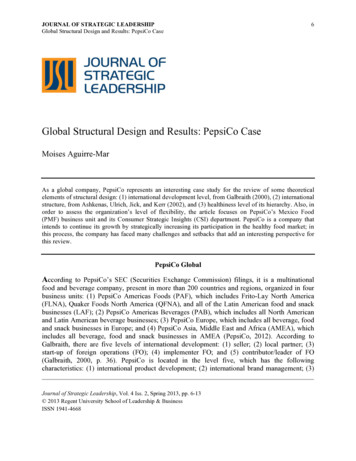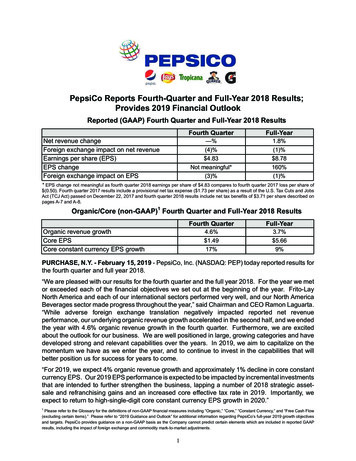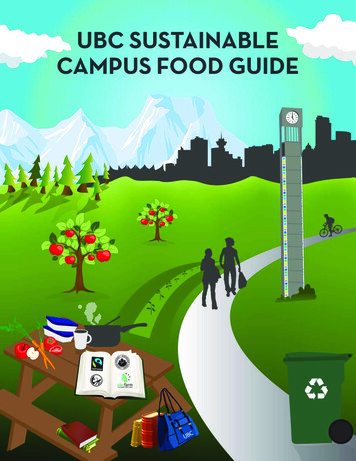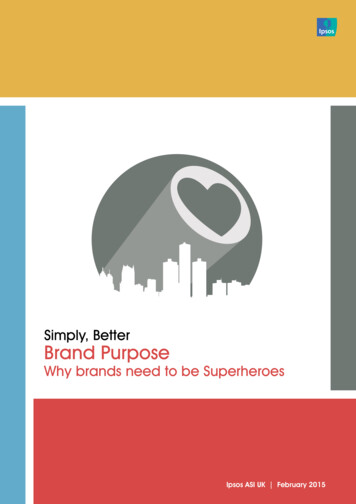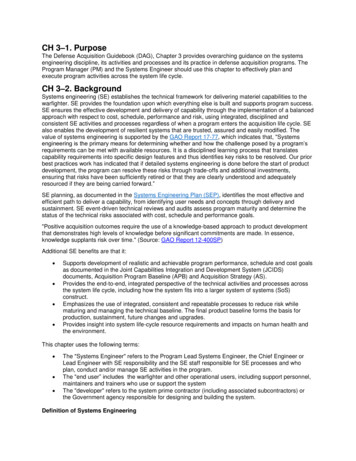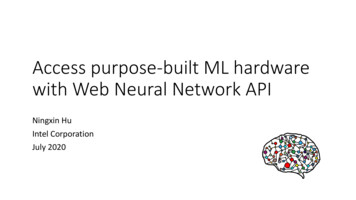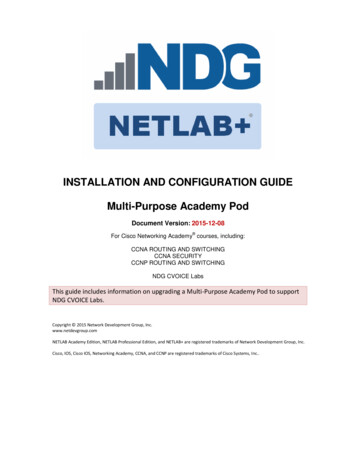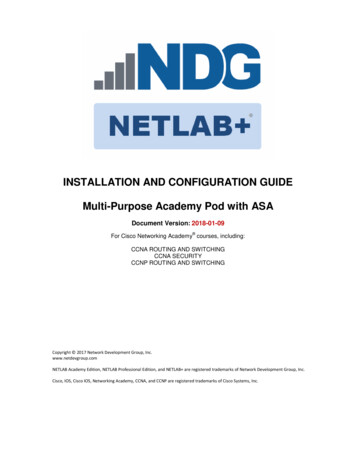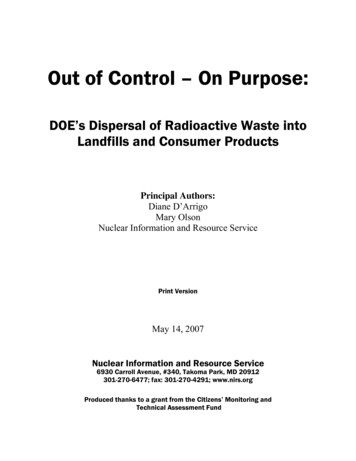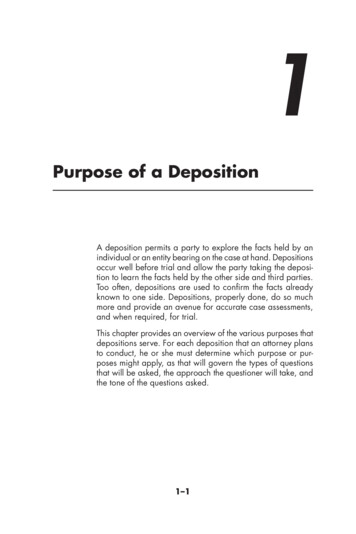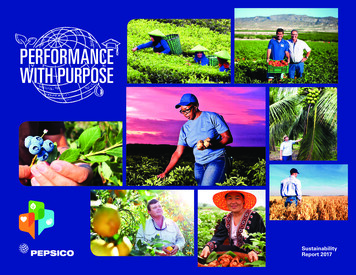
Transcription
PERFORMANCEWITH PURPOSESustainabilityReport 2017
WelcomeOur ApproachProductsPlanetPeopleManaging ImpactPepsiCo makes great-tasting, feel-good food and beverages — from treats to nutritious eats.We’re committed to an approach to business that not only delivers top-tier financial returns, but onethat is responsive to the needs of the more than 200 countries and territories we serve around theworld. That commitment — reflected in a philosophy we call Performance with Purpose — is aboutexpanding our portfolio of more nutritious products, shrinking our environmental footprint as agood global citizen and working to lift up people and families, from widening the circle of opportunityto providing relief in times of need. We’re striving to advance sustainability and profitabilityhand-in-hand — and we believe that in the 21st century, that’s more important than ever before.ABOUT OUR REPORTINGContentsOUR APPROACHAbout PepsiCo CEO Letter Vice Chairman’s Q&A 2017 Financial performance Our sustainability journey so far Progress against our goals PwP through our value chain Sustainable Development Goals 12456789PRODUCTS 10Perspectives 11Our strategy 12Portfolio transformation in action 13Innovation 14Global action 15Case study — Reformulation 16PLANET 17Perspectives 18Our strategy 19Agriculture 20Climate 21Packaging 22Waste 23Global action 24Case study — Access to water 25PEOPLE 26Perspectives 27Our strategy 28Human rights29Economic growth for growers 30Diversity and inclusion 31Global action 32Case study — Womenwith Purpose 33MANAGING IMPACTGRI materiality topicsassessment process 34GRI materiality topicsassessment results 35Governance 36More information 37This is our second year of reporting progress againstour Performance with Purpose (PwP) 2025 Agenda.Our sustainability reporting suite comprises: This 2017 Sustainability Report summarizing key aspectsof the year’s performance 2017 PwP Performance Metrics sheet containing detailedperformance data against our 2025 goals for the past three years Online ‘A-Z Topics’ covering detailed information onprogress, programs, governance and managementCOVER IMAGE1 Tea leaves sourced for PepsiLipton Tea Partnership (Jakarta,Indonesia)2 Tomatoes sourced for AlvalleGazpacho (Murcia, Spain)3 Blueberries sourced for NakedJuice (Pasco, Washington, U.S.)4 Potatoes sourced for Lay’s products(Camden, North Carolina, U.S.)5 Coconuts sourced for Kero Coco(São Mateus, Brazil)6 Oranges sourced for TropicanaJuice (Bradenton, Florida, U.S.)PepsiCo Sustainability Report 2017215436787 Potatoes sourced for Lay’sproducts (Mae Sot, Thailand)8 Oats sourced for Quakerproducts (Saskatchewan,Canada)
WelcomeOur ApproachProductsPlanetPeopleManaging ImpactABOUT PEPSICOPEPSICO HAS A PORTFOLIO OF22BILLIONDOLLARBRANDSthat generated more than 1 billion each in estimated annual retailsales in 2017, spanning Beverages, Snacks and Nutrition.PERFORMANCEWITH PURPOSEPEPSICO PRODUCTS ARE ENJOYEDBY CONSUMERS MORE THANis PepsiCo’s vision to deliver top-tierfinancial performance by improving theproducts we sell, operating responsiblyto protect our planet and empoweringpeople around the world.1BILLIONtimes a day.OUR PRODUCTS ARE SOLD INTHERE ARE MORE THANcountries and territories around the world.PepsiCo employees worldwide.200 260,000PepsiCo Sustainability Report 20171
WelcomeOur ApproachProductsPlanetPeopleManaging ImpactLETTER FROMINDRA NOOYIOur success — andthe success of thecommunities weserve and the widerworld — are inextricablybound together.”Twelve years ago, we embarkedon a journey at PepsiCo that wecall Performance with Purpose.Since then, much has changed —at PepsiCo and around the world— but the underlying principlesbehind Performance with Purposeremain the same.We know we need to deliver the kind oftop-tier financial results our investors,associates and all our stakeholdersexpect. And we also know something else.We know we need to do it with a sense ofpurpose, a moral compass, guiding our way.For me, and all of us at PepsiCo,Performance with Purpose is — and alwayshas been — about the way we make money,not the way we spend it. About who we are,the character of our company.We’ve tried to adhere to the idea of a socialcontract once defined by British statesmanEdmund Burke as a partnership between theliving, those who’ve come before and thoseyet to be born.2PepsiCo Sustainability Report 2017And that means managing PepsiCo with aneye toward not only short-term priorities,but long-term priorities, not only the levelof returns, but the level and duration ofreturns, recognizing that our success —and the success of the communities weserve and the wider world — areinextricably bound together.Much of our early work on Performance withPurpose required us to think differentlyabout our business and make the kinds oflong-term investments — from researchingand developing new, more nutritiousproducts, to finding ways to reduce waterand energy use across plants and farms —that could help us deliver on the vision ofmaking our growth, our operations and ourimpact more sustainable.Our aspiration of creatinga good company —good ethically and goodcommercially — isnow coming to fruition,yielding a broader,more lasting impactthan we ever imagined.’’
WelcomeOur ApproachLETTER FROM INDRA NOOYICONTINUEDSustainability has been defined as “meeting theneeds of the present without compromisingthe ability of future generations to meet theirown needs.” Over the last dozen years, we’ve triedto meet the needs of the present while strengtheningthe ability of future generations to meet theirs,integrating that aspiration into our goals for what weoriginally called Human Sustainability, EnvironmentalSustainability and Talent Sustainability — todayknown as Products, Planet and People:ProductsPLANETWe’ve raised the bar for what it means to be aresponsible corporate water steward, earning theprestigious Stockholm Industry Water Award. In fact, weachieved a 25 percent water-use efficiency improvementbetween 2006 and 2015 in our legacy operations. Andwe’ve invested more than 40 million since 2006 toprovide safe water access around the world, benefitingnearly 16 million people in some of the planet’s mostwater-stressed regions.PlanetPeopleSo, while we still have work to do in certain areas,we’re incredibly proud of the progress we’ve made.Our aspiration of being a good company — goodethically and good commercially — is now comingto fruition, yielding a broader, more lasting impactthan we ever imagined, and setting a standard thatcompanies across our industry and beyond aspireto meet.Looking ahead, we’ll continue viewing our workthrough both a microscope and a telescope, focusingon the most granular details — grams of saturatedfat, parts per billion of greenhouse gas, the numberof women in management roles — as well as thelarger ambition of building a business that acts inaccordance with our values, each of us striving to dowhat’s right for the company and what’s right for ourcommunities. Because at the end of the day, there’sno separating the two.We’ve also made our delivery fleet more energyefficient, eliminating the need for over 1 milliongallons of diesel fuel since our electric vehicleinitiative began in 2010 — the equivalent of keepingmore than 2,000 passenger cars off the road for aPRODUCTSyear — while also making our beverage coolers andWe’ve built on our legacy as the first companyvending machines 60 percent more energy efficient.to voluntarily remove trans fat from our snacks byAnd we are one of the largest users of food-gradeLeading this company remains a sourcereducing added sugars, sodium and saturated fatrecycled PET in the U.S. In fact, if more recycled PETof incredible pride. In my first sustainabilityin our products, launching a revolutionary nutritionwere available, we’d buy it. We’ve also launched thereport letter in 2007, I opened with a story:focused vending option, Hello Goodness, and growing first 100 percent compostable chip bag in test markets,our portfolio of Good for You and Better for You options while diverting more and more of our waste fromfrom about 38 percent of revenue in 2006 to roughlylandfill — approximately 95 percent as of the endWhen I was a child in India, my50 percent last year.* We also teamed up withof 2017.others in our industry to form the Healthy Weightmother would ask my sister and meCommitment Foundation, removing 6.4 trillion Caloriesa simple but compelling question:PEOPLEfrom our food and beverage products, surpassing‘What would you do to change theour collective pledge by more than 400 percent.We’ve reimagined what it means to support ourworld?’ Today, I know my answerAnd through Food for Good, we’ve provided 80 million associates, from ushering in on-site and near-sitenutritious servings to low-income U.S. families sincechildcare at campuses around the world, to expanding would be that I want to lead a2009 to date.PepsiCo University’s online course offerings to helpcompany that is a force for good inassociates upgrade their skills to navigate a rapidlythe world. A company that deliverschanging world. And we’ve also helped lift up thestrong financial performance,communities we serve, playing a critical role indisaster relief efforts from Texas to Florida and Puerto while embracing purpose inRico, Mexico to Ecuador, China to the Philippines.everything it does.”Managing ImpactThat is still my answer. And I know that if we stayfocused on our mission, if we engage the head, heartand hands of our more than 260,000 associates, andadhere to the idea that how we make money is asimportant as how we spend it, we’ll continue doingmore than advancing the heritage of a great andiconic company. We’ll keep changing the world.Sincerely,Indra K. NooyiPepsiCo Chairman and CEO* As we evolve our portfolio and expand our offerings, we are continually updating our definitions of our Good for You, Better for Youand Fun for You categories, and what products fit within each category. Below are 2017 definitions:GOOD FOR YOU options help consumers meet recommended daily intakes of whole grains, vegetables, fruits, dairy, nuts and seedswith low to no amounts of particular nutrients, such as added sugars, sodium or saturated fat.BETTER FOR YOU options can help consumers limit particular nutrients, such as added sugars, sodium or saturated fat, whenincorporated into a well-balanced diet. These options include beverages with fewer or no calories. In this category, we also includeproducts specifically formulated to provide a functional benefit, such as addressing the performance needs of athletes.FUN FOR YOU options are treats for consumers to enjoy responsibly.PepsiCo Sustainability Report 20173
WelcomeOur ApproachProductsPlanetPeopleManaging ImpactQ&A WITHDR. MEHMOOD KHAN Skoll / UNFInterview by Mindy Lubber, ChiefExecutive Officer and President, CeresQ How would you describePepsiCo’s progress against thePerformance with Purpose 2025Agenda goals so far?A I’m proud of our progress. We’recontinuing to transform many of theproducts we make, and how wemake them. We have reformulatedcertain classic products, like 7UPand Mirinda, which now have atleast 30 to 50 percent less addedsugars in dozens of markets aroundthe world. And we’ve launchedsome great new products, such asTropicana Kids, LIFEWTR andQuaker Overnight Oats, which marrythe convenience and great tastethat consumers want with thenutrition and hydration they need.Nearly 80 percent of our directlysourced crops are now grown byfarmers engaged through ourSustainable Farming Program.4PepsiCo Sustainability Report 2017We’re helping them adopt moresustainable practices, increaseyields and improve their livelihoods.Skoll / UNFQ How have you integrated yourgoals into your governance andstrategic planning?Yet we need to do more to lowerWe created a Boardadded sugars, sodium and saturatedsubcommittee focused onfat across our portfolio, especiallyoutside of our biggest markets. And sustainability. Our executive teamis accountable for our progress inplastic waste remains a challenge.meeting our goals — and our bonusWhat are the barriers to moving program directly links bonus awardsto our success in achievingfaster and at greater scale?sustainability goals. Sustainability isThe goals that take the mostalso a key factor in decision-making.work may not show the fastestHow are you usingresults, and much of the change wetransparency and disclosure aswant to see is outside of our directcontrol. Take water consumption or tools for getting results?greenhouse gas emissions. Most ofReports like this are aboutour footprints are in our supplyallowingstakeholders to scrutinizechain. To have an impact there,what we are doing and being openwe have to build coalitions andto outside advice. We’re alwayshelp spread best practices. Thatlooking for ways to extend ourtakes time.transparency — this year, wehave published a separate PwPPerformance Metrics sheet to makeAQAQAit easier to understand our progressat a glance. For more detail, ouronline A–Z Topics is an extensiveand regularly updated resource.Our licenseto operatedepends onachievingsustainability.”Dr. Mehmood KhanPepsiCo’s Vice Chairman and ChiefScientific Officer, Global Researchand DevelopmentQ What gives you hope that the79%A We believe we have no choice.of our directly sourced crops are grownby farmers engaged through ourSustainable Farming Programfood and beverage industry willachieve greater sustainability?Our license to operate depends on it.Consumers and other stakeholdersincreasingly demand it of the entirefood and beverage industry.When we launched Performancewith Purpose in 2006, we wereleading our industry. Within a fewyears, others had caught up. We setambitious new goals in 2016 andwe’re now near the top of the packagain, but it will be difficult tomaintain that because so many ofour peers are also taking action. Ourindustry is changing fast and that’sgreat to see.30–50%less added sugars in reformulated 7UPand MirindaFor
1 Tea leaves sourced for Pepsi Lipton Tea Partnership (Jakarta, Indonesia) 2 Tomatoes sourced for Alvalle Gazpacho (Murcia, Spain) 3 Blueberries sourced for Naked Juice (Pasco, Washington, U.S.) 4 Potatoes sourced for Lay’s products (Camden, North Carolina, U.S.) 5 Coconuts sourced for Kero Coco (São Mateus, Brazil) 6 Oranges sourced for Tropicana Juice (Bradenton, Florida, U.S.) 7 Potatoes .
